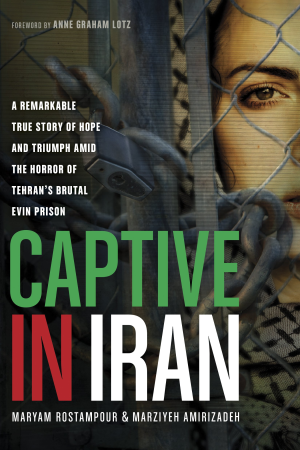- Have you been to Iran or any Muslim country?
- When the girls’ flat was first ransacked, what stood out as a warning sign for their future treatment?
- The testimonies of these two Christian girls were described early in their story. What part of the girls’ testimonies had the most impact on you?
- The first time the interview/interrogation occurred with Mr Rasti he accused them of reading a distorted version of the Bible. He mentioned another ‘correct’ version was on sale in Iran. Have you heard this sort of objection before?
- What sort of women were in prison in Evin Jail and how was it run?
- How would you describe the legal proceedings in the girls’ case? What processes were deployed to deny the girls freedom?
- The book is dedicated to a girl called Shirin. Why was she in jail and what happened to her?
- A question as to whether God could see the plight of the prisoners, and why he seemed to do nothing about it was raised to the girls. How did they answer this?
- What privileges were the girls denied while in prison? How did they respond?
- What or who sustained the girls in one of the darkest, most dangerous places in the world? How did the girls react when they found out the world was praying for them and agitating for their release? Are there any lasting lessons for us to learn from these girls’ endurance and faith?
Islam
CAPTIVE IN IRAN BY Maryam Rostampour and Marziyeh Amirizadeh
 Maryam Rostampour and Marziyeh Amirizadeh knew they were putting their lives on the line. Islamic laws in Iran forbade them from sharing their Christian beliefs, but in three years, they’d covertly put New Testaments into the hands of twenty thousand of their countrymen and started two secret house churches.
Maryam Rostampour and Marziyeh Amirizadeh knew they were putting their lives on the line. Islamic laws in Iran forbade them from sharing their Christian beliefs, but in three years, they’d covertly put New Testaments into the hands of twenty thousand of their countrymen and started two secret house churches.
In 2009, they were finally arrested and held in the notorious Evin Prison in Tehran, a place where inmates are routinely tortured and executions are commonplace. In the face of ruthless interrogations, persecution, and a death sentence, Maryam and Marziyeh chose to take the radical―and dangerous―step of sharing their faith inside the very walls of the government stronghold that was meant to silence them. In Captive in Iran, two courageous Iranian women recount how God used their 259 days in Evin Prison to shine His light into one of the world’s darkest places, giving hope to those who had lost everything and showing love to those in despair.
Questions for Hiding in the Light by Rifqa Bary
- Rifqa’s mother allowed her to use nail polish in secret. ‘I knew once I was old enough to pray I would not be allowed to use it anymore’ says Rifqa. Are there aspects in Australian Christian families which reflect this thinking? Were there forbidden things in your family which you were allowed to do as a child? (e.g. drink beer, tell lies, say rude words)? Is lenience a form of grace or a failure to instil good habits?
- When Rifqa suffered an injury how did the family respond? How do we cope with disability in our families?
- Early in her story Rifqa reveals she was sexually abused by a distant uncle. Rather than blame the perpetrator the family seemed to blame her. Later, similar responses seemed to come when violence caused bruising and absenteeism. Is this behaviour a defence mechanism or a product of a family history of abuse over generations, perhaps even cultural acceptance of violence?
- The difference between boys’ and girls’ upbringing was/is very marked in the Muslim family. Are there similarities in the Christian home?
- Rifqa was fascinated by the prayers of Christians. Have you ever experienced that fascination? Do you pray with visitors in your own home?
- Though Rifqa’s mother was an excellent cook and spent many hours preparing food, the family never ate together. Do you think eating together is important? How is it possible in this day of crammed activities to make this happen?
- When Rifqa met Angela what struck you as surprising in that relationship?
- What stood out to you when Rifqa became a Christian in secret?
- What emotions did you experience when Rifqa ran away from home?
- When Rifqa was confined to a Juvenile Detention Centre, an awful foster home, then suffered terminal cancer, did God’s plan seem to be for harm rather than to “prosper” her? Jer 29:11
Hiding in the Light by Rifqa Bary
Rifqa Bary grew up in a devout Muslim home, obediently following her parents’ orders to practice the rituals of Islam. But God was calling her to freedom and love. He was calling her to true faith. He was calling her to give up everything. Leaving Islam for Christianity cost her more than she imagined but gave more than she could have dreamed. Hiding in the Light is the story of Rifqa’s remarkable spiritual journey from Islam to Christianity. It is also the untold story of how she ran from her father’s threats to find refuge with strangers in Florida, only to face a controversial court case that reached national headlines. Most of all, it is the story of a young girl who made life-changing sacrifices to follow Jesus-and who inspires us to do the same. Teens and young adults will be moved by Rifqa’s story of standing up to religious persecution, literally giving up everything to follow her faith.